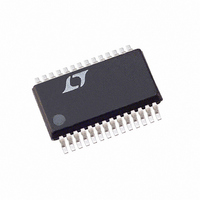LTC1628IG-SYNC#TRPBF Linear Technology, LTC1628IG-SYNC#TRPBF Datasheet - Page 16

LTC1628IG-SYNC#TRPBF
Manufacturer Part Number
LTC1628IG-SYNC#TRPBF
Description
IC SW REG STEP-DOWN 28-SSOP
Manufacturer
Linear Technology
Type
Step-Down (Buck)r
Datasheet
1.LTC1628CG-SYNCPBF.pdf
(32 pages)
Specifications of LTC1628IG-SYNC#TRPBF
Internal Switch(s)
No
Synchronous Rectifier
Yes
Number Of Outputs
2
Voltage - Output
Adj to 0.8V
Current - Output
3A
Frequency - Switching
140kHz ~ 310kHz
Voltage - Input
3.5 ~ 30 V
Operating Temperature
-40°C ~ 85°C
Mounting Type
Surface Mount
Package / Case
28-SSOP
Lead Free Status / RoHS Status
Lead free / RoHS Compliant
Power - Output
-
Available stocks
Company
Part Number
Manufacturer
Quantity
Price
APPLICATIO S I FOR ATIO
LTC1628-SYNC
the design. Always consult the manufacturer if there is
any question.
The benefit of the LTC1628-SYNC multiphase can be
calculated by using the equation above for the higher
power controller and then calculating the loss that would
have resulted if both controller channels switch on at the
same time. The total RMS power lost is lower when both
controllers are operating due to the interleaving of current
pulses through the input capacitor’s ESR. This is why the
input capacitor’s requirement calculated above for the
worst-case controller is adequate for the dual controller
design. Remember that input protection fuse resistance,
battery resistance and PC board trace resistance losses
are also reduced due to the reduced peak currents in a
multiphase system. The overall benefit of a multiphase
design will only be fully realized when the source imped-
ance of the power supply/battery is included in the effi-
ciency testing. The drains of the two top MOSFETS should
be placed within 1cm of each other and share a common
C
sirable voltage and current resonances at V
The selection of C
series resistance (ESR). Typically once the ESR require-
ment is satisfied the capacitance is adequate for filtering.
The output ripple (∆V
Where f = operating frequency, C
and ∆I
is highest at maximum input voltage since ∆I
with input voltage. With ∆I
ripple will typically be less than 50mV at max V
ing:
The first condition relates to the ripple current into the
ESR of the output capacitance while the second term
guarantees that the output capacitance does not signifi-
cantly discharge during the operating frequency period
16
IN
C
and C
∆
(s). Separating the drains and C
OUT
V
OUT
L
= ripple current in the inductor. The output ripple
Recommended ESR < 2 R
OUT
≈
∆
> 1/(8fR
I ESR
L
⎛
⎜
⎝
OUT
U
SENSE
OUT
+
is driven by the required effective
8
) is determined by:
U
fC
)
1
OUT
L
= 0.3I
OUT
⎞
⎟
⎠
SENSE
W
IN
= output capacitance,
OUT(MAX)
may produce unde-
IN
.
L
the output
U
IN
increases
assum-
due to ripple current. The choice of using smaller output
capacitance increases the ripple voltage due to the dis-
charging term but can be compensated for by using
capacitors of very low ESR to maintain the ripple voltage
at or below 50mV. The I
components can be optimized to provide stable, high
performance transient response regardless of the output
capacitors selected.
Manufacturers such as Nichicon, United Chemicon and
Sanyo can be considered for high performance through-
hole capacitors. The OS-CON semiconductor dielectric
capacitor available from Sanyo has the lowest (ESR)(size)
product of any aluminum electrolytic at a somewhat
higher price. An additional ceramic capacitor in parallel
with OS-CON capacitors is recommended to reduce the
inductance effects.
In surface mount applications multiple capacitors may
need to be used in parallel to meet the ESR, RMS current
handling and load step requirements of the application.
Aluminum electrolytic, dry tantalum and special polymer
capacitors are available in surface mount packages. Spe-
cial polymer surface mount capacitors offer very low ESR
but have lower storage capacity per unit volume than other
capacitor types. These capacitors offer a very cost-effec-
tive output capacitor solution and are an ideal choice when
combined with a controller having high loop bandwidth.
Tantalum capacitors offer the highest capacitance density
and are often used as output capacitors for switching
regulators having controlled soft-start. Several excellent
surge-tested choices are the AVX TPS, AVX TPSV or the
KEMET T510 series of surface mount tantalums, available
in case heights ranging from 2mm to 4mm. Aluminum
electrolytic capacitors can be used in cost-driven applica-
tions providing that consideration is given to ripple current
ratings, temperature and long term reliability. A typical
application will require several to many aluminum electro-
lytic capacitors in parallel. A combination of the above
mentioned capacitors will often result in maximizing per-
formance and minimizing overall cost. Other capacitor
types include Nichicon PL series, NEC Neocap, Cornell
Dubilier ESRE and Sprague 595D series. Consult manu-
facturers for other specific recommendations.
TH
pin OPTI-LOOP compensation
1628syncfa














